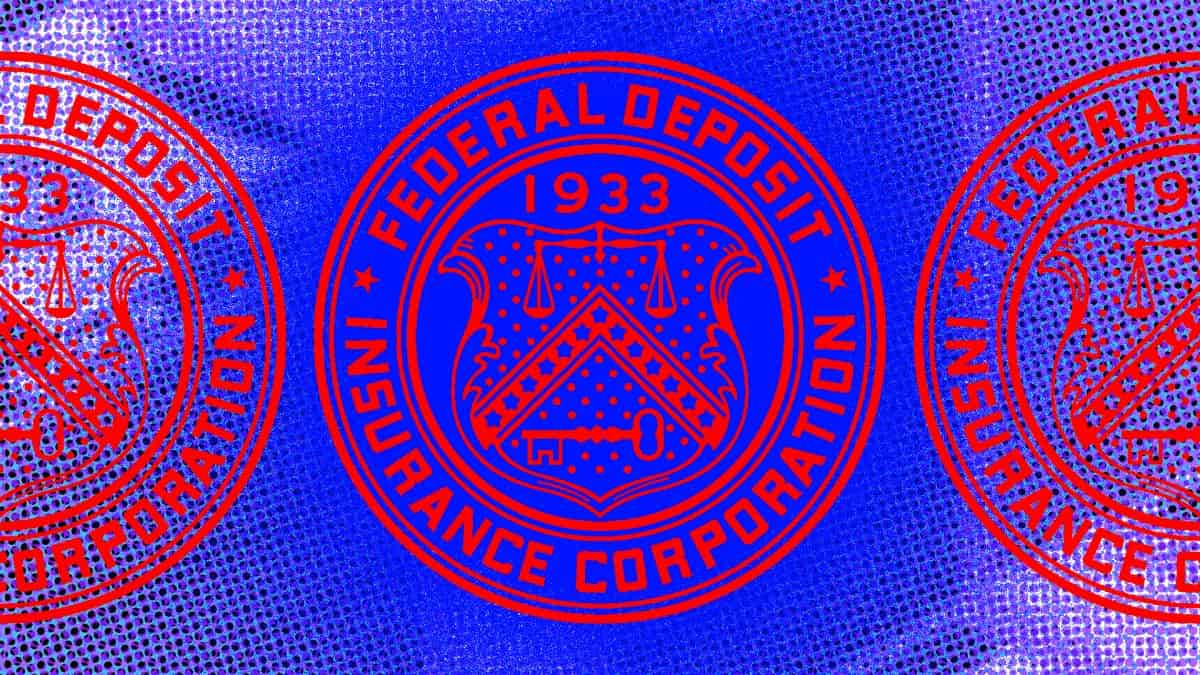US FDIC moves to put an end to 'reputational risk' following criticism from crypto industry
Quick Take Lawmakers and crypto industry leaders have argued that digital asset firms face unique challenges when establishing and maintaining accounts in the U.S. The FDIC’s move comes after the U.S. Office of the Comptroller of the Currency said it had ended examining national banks and other financial institutions for reputation risk last week.
 The U.S. Federal Deposit Insurance Corporation is moving to extinguish the use of reputational risk as a way to supervise banks following criticism from some in the crypto industry who say they have been blocked from key financial services.
The U.S. Federal Deposit Insurance Corporation is moving to extinguish the use of reputational risk as a way to supervise banks following criticism from some in the crypto industry who say they have been blocked from key financial services.
The FDIC is "actively working on a new direction on digital assets policy," said Travis Hill, who was appointed acting chair of the FDIC in January by President Donald Trump, in a letter sent to Rep. Dan Meuser, R-Pa. on Monday.
Hill had previously urged the agency to take a more open approach to crypto. In his letter, he said banking regulators should not use reputational risks as a way for "supervisory criticisms."
"While a bank's reputation is critically important, most activities that could threaten a bank's reputation do so through traditional risk channels (e.g., credit risk, market risk, etc.) that supervisors already focus on," Hill said in the letter obtained by The Block.
Hill said the agency had done a review of mentions of reputational risk in its policy documents, guidance, examination manuals and rules.
"We are actively working on a rulemaking to ensure supervisors do not criticize activities or actions on the basis of reputational risk, which we expect to be able to issue in the near-future," Hill said.
Politico earlier reported the news. Hill's letter on Monday was sent in response to a letter sent by Meuser and other Republican leaders in late February that included recommendations for digital asset rules and ways to prevent debanking.
Other moves
Another federal agency also moved to eliminate reputation risk in its repertoire. Last week, the U.S. Office of the Comptroller of the Currency said it had ended examining national banks and other financial institutions for reputation risk. The OCC also said it would remove references to reputation risk from its handbooks and guidance, though it noted it would not change its expectations on how banks handle risks.
Lawmakers and crypto industry leaders have argued that digital asset firms face unique challenges when establishing and maintaining accounts in the U.S. Senate Banking Committee Chair Tim Scott, R-S.C., introduced a bill, shorthand known as the FIRM Act, to address the issue and would eliminate references to reputational risk as a way for federal regulators to supervise financial institutions. His committee voted to advance that bill earlier this month, though no Democrats voted in support of the bill.
The Senate Banking Committee, led by Republicans, posted on X about the FDIC's move and said the agency is "going to eliminate the use of reputational risk as a component of bank supervision."
"This follows the Committee’s passage of @SenatorTimScott’s FIRM Act, which would codify the elimination of reputational risk across all federal banking regulators," the committee said on Monday night in a post on X.
The issue around debanking and crypto is often referred to as "Operation Choke Point 2.0," a phrase coined by Castle Island Ventures co-founder Nic Carter in 2023, drawing a comparison to Operation Choke Point 1.0, a 2013 U.S. Department of Justice Initiative that sought to limit banking services for industries considered high-risk for fraud and money laundering, including payday lenders and firearm dealers.
President Donald Trump has also used the term and has said he would end the practice.
Matthew Sigel, VanEck’s head of digital assets research, called the FDIC's move a "big win against Chokepoint 2.0," in a post on X.
"FDIC backing off 'reputational risk' means fewer excuses to debank industries they don’t like," Sigel said Tuesday. "Credit should flow based on balance sheets, not political agendas."
Disclaimer: The content of this article solely reflects the author's opinion and does not represent the platform in any capacity. This article is not intended to serve as a reference for making investment decisions.
You may also like
After bitcoin returns to $90,000, is Christmas or a Christmas crash coming next?
This Thanksgiving, we are grateful for bitcoin returning to $90,000.

Bitcoin security reaches a historic high, but miner revenue drops to a historic low. Where will mining companies find new sources of income?
The current paradox of the Bitcoin network is particularly striking: while the protocol layer has never been more secure due to high hash power, the underlying mining industry is facing pressure from capital liquidation and consolidation.

What are the privacy messaging apps Session and SimpleX donated by Vitalik?
Why did Vitalik take action? From content encryption to metadata privacy.

The covert war escalates: Hyperliquid faces a "kamikaze" attack, but the real battle may have just begun
The attacker incurred a loss of 3 million in a "suicidal" attack, but may have achieved breakeven through external hedging. This appears more like a low-cost "stress test" targeting the protocol's defensive capabilities.

